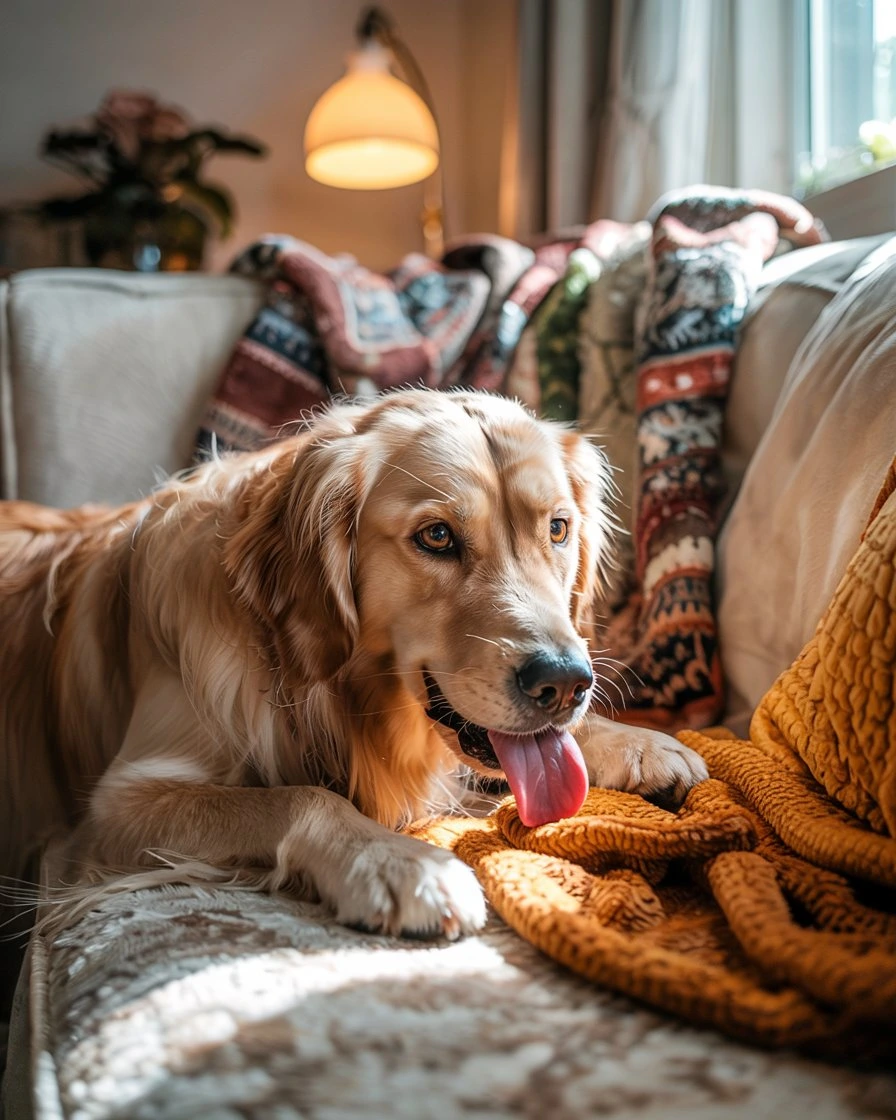🐶 Introduction
Wondering why does my dog lick the couch? This behavior might seem odd, but it’s common and usually linked to things like boredom, anxiety, or health issues. In this guide, we’ll explore the possible causes and how to stop it.
Couch licking is a common behavior in dogs, and while it might seem harmless, it can actually be a sign of something deeper, like boredom, anxiety, or even a medical issue. This guide will explain why dogs lick furniture, what it means, when it’s something to worry about, and how to stop it.
1. Why Do Dogs Lick Things?
Licking is one of the main ways dogs interact with the world around them. They lick to explore, communicate, comfort themselves, and sometimes to relieve stress. But when licking becomes too frequent or when your dog starts licking unusual things like couches it’s time to look closer.
Common reasons dogs lick everything:
- Exploration: Dogs experience the world through taste and smell.
- Comfort: Licking releases feel-good endorphins in dogs.
- Habit or boredom: Dogs may develop repetitive behaviors if they’re understimulated.
- Health problems: Nausea, dental pain, or skin irritation can trigger licking.
So if you’ve been thinking, “Why does my dog lick everything around the house?”, this section might already be giving you clues.
Reasons Why Dogs Lick the Couch
Let’s look at the most common couch-licking triggers in dogs.
a. Food Residue
Crumbs, spills, and snacks leave behind tasty traces. Your dog might be licking the couch because it smells like food—even if it’s weeks old.
b. Boredom
Lack of physical or mental stimulation can lead to odd behaviors. Couch licking might just be your dog trying to pass time.
c. Anxiety or Stress
Dogs often use licking as a calming mechanism. Changes in environment, loud noises, or separation anxiety can all lead to obsessive behaviors.
d. Seeking Attention
If licking the couch gets a reaction from you (even a “Stop that!”), your dog might keep doing it for attention.
e. Comforting Habit
Licking provides a repetitive, soothing action like thumb-sucking in kids.
f. OCD (Obsessive-Compulsive Disorder)
Some dogs develop compulsive behaviors like licking, spinning, or chewing. These behaviors need professional support to manage.
g. Underlying Medical Issue
GI problems, allergies, nausea, or even dental discomfort can drive a dog to lick soft surfaces for relief. If your dog suddenly starts licking the couch and won’t stop, it’s worth a vet visit.
3. When is Licking a Problem?
It’s normal for dogs to lick occasionally. But if the licking is:
- Constant or obsessive
- Paired with other behaviors (whining, pacing, chewing)
- Disrupting your dog’s routine
- Causing raw spots or hair loss
…then it’s time to consider excessive licking in dogs as a real concern.
If your dog is not just licking the couch, but also the floors, walls, or air, this points to a compulsive issue or a medical condition that needs attention.
How to Stop Your Dog From Licking the Couch
You can reduce or stop this behavior with these practical steps:
1. Clean the Couch Thoroughly
Remove any food smells or scent residues. Use pet-safe cleaners.
2. Keep Your Dog Busy
Try chew toys, treat puzzles, long walks, or training sessions. Mental stimulation is key.
3. Set a Routine
Dogs feel secure with structure. Feed, walk, and play at consistent times daily.
4. Reward Good Behavior
When your dog stops licking, offer praise, a treat, or playtime. Positive reinforcement works.
5. Redirect Their Focus
When you see licking start, offer an alternative: a chew toy, bone, or game.
6. Use Deterrent Sprays (Optional)
Pet-safe bitter sprays can discourage licking furniture, but use them as a last resort and with caution.
7. Consult a Professional
If nothing works, speak with your vet or a certified dog behaviorist. There may be an underlying health issue or anxiety that needs treating.
Related Behaviors to Watch
If your dog is licking everything not just the couch this could be related:
- Floor licking: May suggest nausea or gastrointestinal issues
- Wall or object licking: Often linked to OCD or sensory seeking
- Paw licking: Could indicate allergies or skin infections
- Licking people constantly: Usually affection, but can also mean anxiety
All of these fall under the wider category of excessive licking in dogs.
When to Visit the Vet
Schedule a vet visit if:
- The behavior started suddenly
- It’s constant or worsening
- There are other symptoms (vomiting, lethargy, diarrhea, whining)
- Your dog won’t eat or play as usual
The vet may check for digestive problems, allergies, dental pain, or neurological causes.
Conclusion
So, why does your dog lick the couch? It could be something as harmless as leftover snacks or a sign of boredom, stress, or health problems. The key is to observe, clean, redirect, and if needed, get help from a vet or behaviorist.
And if you’re asking “Why is my dog licking everything all the time?”, it’s probably time to dig deeper. A happy, healthy, and mentally stimulated dog usually doesn’t feel the need to lick furniture nonstop.

